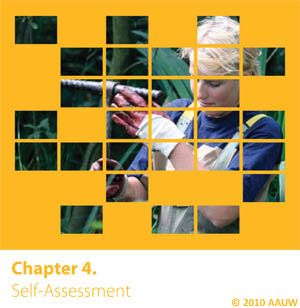


Cultivating a Culture of Respect to Attract Women to STEM
Individuals form career aspirations in part by drawing on perceptions of their own competence at career-relevant tasks. As described here earlier this week, Stanford University sociologist Shelley Correll's research shows that the cultural association of mathematical competence with boys and men negatively influences girls' self-assessments compared with boys' and raises the standard by which they judge themselves. Girls' lower self-assessment of their math ability, even in the face of good grades and test scores, contributes to fewer girls expressing preference for and aspiring to science, technology, engineering, and math (STEM) careers.
 This means that many capable young women may not be choosing to pursue careers in science or engineering because of belief structures in the general culture that suggest that science and engineering are men's work. This has implications for the future of science and engineering because those who decide to pursue STEM careers may not actually be those who are best qualified for these careers.
This means that many capable young women may not be choosing to pursue careers in science or engineering because of belief structures in the general culture that suggest that science and engineering are men's work. This has implications for the future of science and engineering because those who decide to pursue STEM careers may not actually be those who are best qualified for these careers.
Correll's research shows that girls' self-assessments are influenced by the stereotypes that are operating in their immediate environment. When institutions (including K-12 schools, universities, and workplaces) and individuals cultivate a culture of respect and send the message that girls and boys are equally capable of achieving in math and science, girls are more likely to assess their abilities more accurately and consider a future as a scientist or engineer.
As Correll explained in an interview with AAUW, "Enhancing how girls feel about themselves is very, very important, but if we don't do the flip side and change how other people feel about girls, we're setting girls up to feel good about themselves only to encounter structures that are really pretty negative for them."
Any thoughts?

Hi Christi,
I have to quote President Shirley TIlghman of Princeton, a Canadian molecular biologist. In the article I quoted in my latest posting, she said, "There may be signals out there that tell me I can't do this, but I'm not going to recognize them. Adrenaline is a great hormone." In other words, at least some women just tune it out if it's negative. If only every girl could! But we need to make science safe for those who cannot do that.
cheers,
Laura















